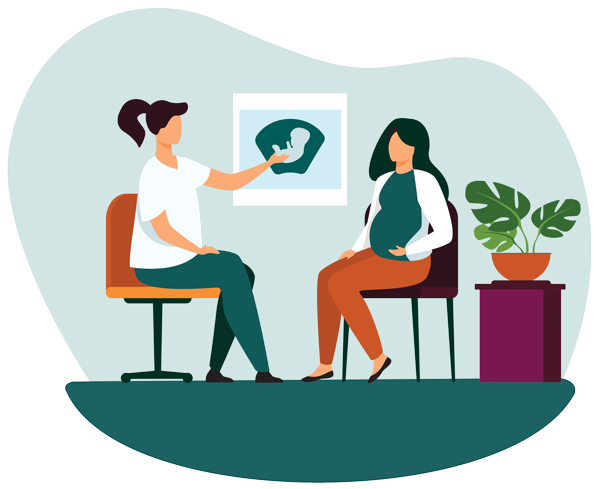Kidney And Urinary Tract Ultrasound Sacn

Kidney And Urinary Tract Ultrasound Sacn
A kidney and bladder ultrasound, also known as a urinary tract ultrasound, examines the kidneys, ureters, and bladder to detect issues like cysts, tumours, or infections. London Private Ultrasound (LPU) provides this scan for patients over 18, commonly sought for kidney pain, blood in urine, or urinary infections.
Frequently Asked Questions:
What are some common reasons for requiring an abdominal and urinary trac ultrasound scan?
1. In the case of abdominal pain or discomfort, ultrasound scans can help to investigate the cause.
2. Urinary tract infections can also be diagnosed or ruled out through ultrasound scans.
3. Kidney stones or other abnormalities in the urinary tract can be detected through ultrasound scans.
4. Abdominal ultrasound scans can also detect liver problems like cirrhosis, liver disease, or fatty liver.
5. Ultrasound scans can be used to identify masses or cysts on the kidneys or other organs in the abdomen.
6. Ultrasound scans may be ordered as part of routine prenatal care to check the health of the developing fetus.
Overall, ultrasound scans are a non-invasive and safe way to diagnose and monitor a wide range of medical conditions.
What leads to kidney and urinary problems?
Why might someone need a ultrasound of their urinary tract?
A urinary tract ultrasound might be suggested for individuals experiencing:
- Flank Pain: This pain around the lower back area can have various causes. Damaged kidneys or kidney stones could be culprits. An ultrasound can effectively pinpoint the kidneys and evaluate their health.
- Urine Irregularities: Changes in urine output or consistency can signal kidney issues. If someone feels the urge to urinate frequently in small amounts, or if the bladder feels full but little urine is produced, an ultrasound might be in order. Blood in the urine is another red flag.
- Elevated Creatinine Levels: Creatinine, a by-product of creatine used by muscles for energy, can be detected through a blood test. Abnormal levels might point to kidney troubles.
- Kidney Ailments: Abnormalities like tumours, cysts, or hereditary disorders like polycystic kidney disease can manifest in the kidneys. These can be identified via ultrasound.
- Post Kidney Transplant: Monitoring newly transplanted kidneys is crucial as they can be susceptible to disease or rejection.
- The ultrasound procedure is non-intrusive, making it safe and painless. Depending on the findings, further tests might be recommended by the doctor to solidify a diagnosis or create a tailored treatment strategy.
What are the usual signs of a problem with the kidneys or bladder?
There are several signs and symptoms that indicate a problem with the kidneys or bladder. These include:
- Frequent urination,
- Painful urination,
- Blood in the urine,
- Difficulty starting or stopping urination
- Weak urine stream
- Abdominal or back pain
- and fever (flue like symptoms).
- Other symptoms includes swelling in the legs, ankles, and feet, fatigue, nausea and vomiting, and high blood pressure.
- Additionally, kidney problems can cause changes in the color and smell of urine, while bladder problems can cause urinary incontinence.
It is important to seek medical attention if any of these symptoms persist or worsen, as they can be indicative of a more serious condition. Early diagnosis and treatment of kidney and bladder problems can help prevent complications and improve outcomes.
When should you visit a doctor for issues with your kidneys or urinating?
Why use ultrasound to check for problems with the kidneys and urinary system?
Urinary tract, also known as renal ultrasounds, are non-invasive and pain-free diagnostic tools. They are commonly used to detect and evaluate:
- Indications of Infection: Checking for inflammation or other signs that suggest an infection.
- Kidney Dimensions: Measuring the size to see if it’s within the normal range.
- Evidence of Kidney Damage: Looking for signs of trauma or injury to the kidneys.
- Birth Defects: Identifying any congenital irregularities in the renal structure.
- Blockages or Large Stones: Spotting any obstructions or sizable kidney stones that might cause pain or complications.
- Growth Anomalies: Detecting cysts, tumours, or other abnormal growths in the urinary tract.
what is the procedure of abdomen and urinary trac ultrasound scan?
During the ultrasound:
- Get ready to feel confident during your ultrasound procedure. Once you are guided and comfortably lying on the ultrasound table, you might need to slightly loosen your trousers. Your clothes will be covered to make sure that they don’t get stained by the ultrasound gel.
- The ultrasound gel will be applied to the targeted area. This gel enhances the quality of the images captured, allowing the handheld probe known as a transducer to emit sound waves and create images of the internal structures.
- You will be instructed on how to take deep breaths or hold your breath occasionally. There might also be a need for you to shift onto your side to capture images from different perspectives. You’ll feel confident throughout the scan, as the sonographer is skilled and experienced.
- If the focus is on your bladder, images might first be taken when your bladder is full, and after that, you’ll be asked to empty your bladder for subsequent images. Once the scan is completed, tissues will be handed to you to clean off the gel, and you can redress.
- You’ll feel confident with the room’s subdued lighting, allowing for a clearer view of the images on the monitor. Your sonographer will discuss the results, any notable observations, and suggestions with you, ensuring that you feel confident in the process and your well-being.
Preparation for this scan.
- Drink One liter of still water (2 Pints) One hour before your scan.
- Do NOT use the toilet so you would arrive with a full bladder.
- Medication can be taken as normal.
Do i need to do anything after the exam?
When will i receive my result?
After your scan, the person doing the scan will tell you the results in words.
Then, they will look closely at the pictures from the scan and write a report with any advice within 24 hours. They will send you the report so that you can talk to your doctor about the results (if you need to).
Kidney And Urinary Tract Ultrasound Sacn
Checks For:-
Kidney Stones
-
Bladder Stones
-
Signs of Cancer
-
Signs of Infection
-
Tumours
-
Masses & Lumps
-
Inflammation
-
Inborn Abnormalities
10 Years of Experience
Our Medical Ultrasound specialists are fully qualified with more than 10 years of experience. They are accredited and registered with their respective governing bodies.
latest technology
Using the latest technology, We follow all local protocols and national guidelines to provide the best diagnostic ultrasound service in London.
No Waiting List
We offer urgent appointments with no waiting list. We also collaborate with Private GPs, Specialists, and an onsite Pathology Laboratory.
No need for Referral
We offer a professional and affordable private Ultrasound Scan Service, allowing you to self-refer without the need for any referral from your GP.

